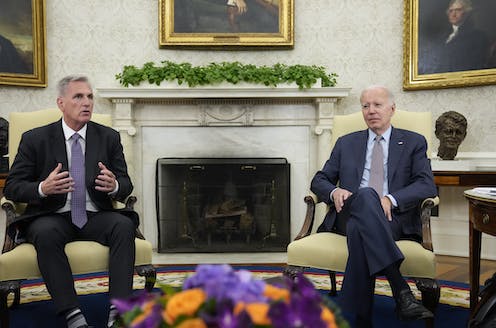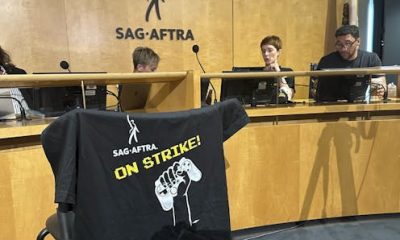
House Speaker Kevin McCarthy, left, meets with President Joe Biden to discuss the debt limit in the White House on May 22, 2023. AP Photo/Alex Brandon
There’s progress on the debt limit. There’s no progress. Conservatives have revolted. Liberal Democrats are angry. Negotiators actually ate a meal together. That’s a good sign. No it isn’t. Who’s up? Who’s down?
Much of the breathless news coverage of the debt limit crisis relies on leaks, speculation, wishful thinking and maybe even the reading of tea leaves. The Conversation decided to tap an expert on congressional behavior, Northwestern University political scientist Laurel Harbridge-Yong, and ask her what she sees when she looks at the negotiations. Harbridge-Yong is a specialist in partisan conflict and the lack of bipartisan agreement in American politics, so her expertise is tailor-made for the moment.
What do the debt limit negotiations look like to you?
The difficulty that Congress and the White House are having in reaching compromises highlights two aspects of contemporary politics. The first: Since the 1970s, both the House and Senate have become much more polarized. Members of the two parties are more unified internally and further apart from the opposing party. You don’t have the overlap between parties now that existed 50 years ago.
Even as we’ve had rising polarization, we still have important differences within the parties. Not every Democrat is the same as another and not every Republican is the same.
This relates to a second point: Members’ individual and collective interests shape their behavior. For Republicans in more competitive districts, their own individual electoral interests probably say, “Let’s cut a deal. Let’s not risk a default that the Republicans get blamed for, and which is going to run really poorly in my district.”
On the other hand, House Freedom Caucus Republicans come from really safe districts, and they care more about their primary elections than they do their general elections. So their own electoral interests say, “Stand firm, fight till the bitter end, try to force the hand of the president.”
Speaker of the House Kevin McCarthy, R-Calif., center, said on May 25, 2023, that he is optimistic that White House and GOP negotiators can reach a deal.
Kent Nishimura / Los Angeles Times via Getty Images
These kinds of electoral interests occur at the individual and collective levels for members of a party. Since the 1980s, and accelerating into the 1990s, there’s been a lot more competition for majority control, and as a result the two parties don’t want to do things that let the other party look good. They don’t want to give the other party a win in the eyes of the voter.
So you now have many Republicans who are more willing to fight quite hard against the Democrats because they don’t want to give a win to Biden.
Democrats are also resistant to compromising, both because they don’t want to gut programs that they put in place and also because they don’t want to make this look like a win for Republicans, who were able to play chicken and get what they wanted.
These dynamics, layered on top of policy interests, all contribute to the problems that we’re seeing now.
What’s the role of brinkmanship in this conflict?
When I think of brinkmanship, I’m thinking about negotiating tactics that push things until the very last minute to try to secure the most concessions for your side. Right now that means coming to the edge of potential default on the debt.
Does brinkmanship work?
I was looking back at some of the previous government shutdowns as well as debt ceiling negotiations. In some instances concessions were granted, so brinkmanship paid off. In other instances it was less obvious that there was a win, and in some instances there was perhaps a penalty, when the parties couldn’t agree and there was a government shutdown.
One party may be banking on the fact that the other party’s going to get blamed by the public while their own party reputation won’t be hurt. In the 1990s, it seemed like it was the Republicans who took the brunt of the blame for a government shutdown.
There have been instances in which parties get something out of brinkmanship, as in the government shutdown at the beginning of the Trump administration over funding for the border wall. The Democrats ended up giving some money for the border wall. It wasn’t all of what Trump wanted, but it was part of what Trump and the Republicans wanted.
Brinkmanship and gridlock are disproportionately consequential for Democrats, who generally want to expand government programs, versus for Republicans, who tend to want to constrict government programs. So gridlock or forced spending cuts are easier for Republicans to stomach than Democrats. It may be part of why we see Republicans going harder on this kind of brinkmanship.
How does the public see brinkmanship?
On the whole, I think the public doesn’t like it.
My own work has shown that the public does not like gridlock on issues in which people agree on the end goal. The public, on average, even prefers a victory for the other side over policy gridlock.
A win for their own side is the best outcome, a compromise is next best, a win for the other side is next best after that. Gridlock is the worst outcome.
The place where it gets a little bit more challenging is that how people understand and interpret politics is heavily shaped by how politics is framed to them.
Conservative politicians and media spin the debt ceiling very much as fiscal responsibility, saying this is just like a family’s personal budget at home or that it’s really important to not just raise the debt limit without spending concessions.
Those on the Democratic side are hearing that the Republicans are holding the country hostage, we can’t give in to them, this will gut really important programs, and so forth.
So on the one hand, the public doesn’t like gridlock – especially gridlock when the consequences are so bad, as default would be. On the other hand, voters in each party’s base are hearing the story framed in very different ways. Both sides may end up blaming the other side. They’re not necessarily going to be calling their legislators and asking them to compromise.
Congressional Progressive Caucus Chair Rep. Pramila Jayapal, D-Wash., speaks about the debt limit and negotiations to reach a deal on May 24, 2023, in Washington, D.C.
Photo by Nathan Posner/Anadolu Agency via Getty Images
Democracy is about representation. As they conduct these negotiations, do lawmakers see themselves as representing voters?
Many conservative Republicans who are holding firm may believe that they are good representatives of what the base wants. They represent very strongly partisan districts who may agree with them that they need to fight for concessions.
In the recent book that I wrote with Sarah Anderson and Daniel Butler, we found that legislators believe their primary voters want them to reject compromises.
But in today’s crisis, those constituents may not really understand the consequences of default. Sometimes good representation doesn’t just mean doing what the public wants – legislators have better information or understanding of how things work and should do what’s in the best interests of their constituents.
However, even if individual members are trying to represent their districts or their states, when we think about this at a more aggregate or collective level, we don’t see great representation. Individual legislators may be thinking they’re representing constituents, but that leads to an aggregate that is not representative of the country as a whole.
What the public as a whole – which tends to be more moderate – wants is compromise and resolution of this issue.
Laurel Harbridge-Yong has received funding from the National Science Foundation, the Social Science Research Council, Unite America, the Electoral Integrity Project, and the Dirksen Congressional Center.
Advertisement

Advertisement
Contact Us
If you would like to place dofollow backlinks in our website or paid content reach out to info@qhubonews.com











